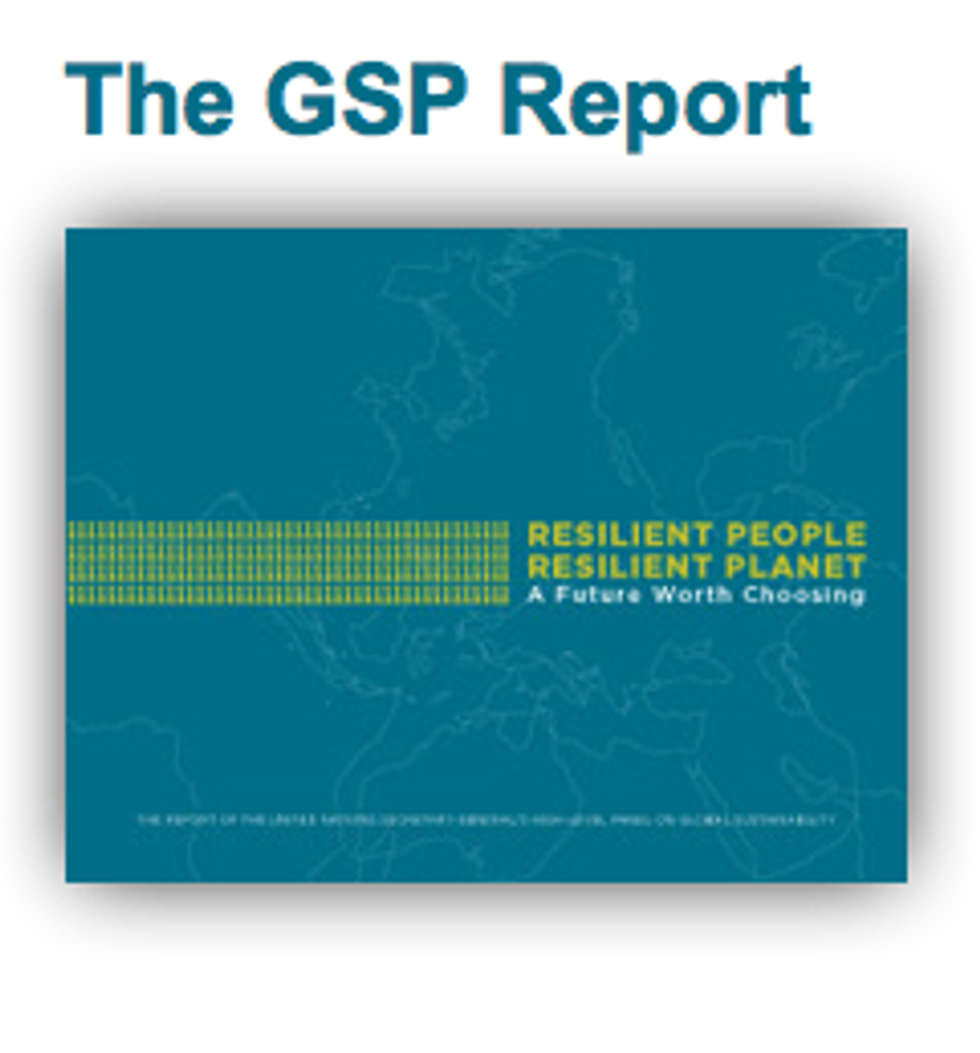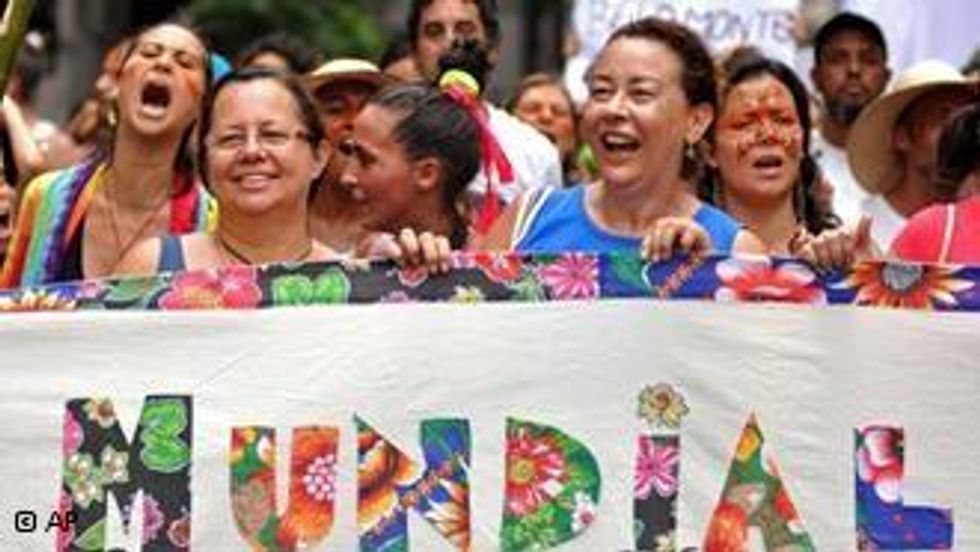

SUBSCRIBE TO OUR FREE NEWSLETTER
Daily news & progressive opinion—funded by the people, not the corporations—delivered straight to your inbox.
5
#000000
#FFFFFF
To donate by check, phone, or other method, see our More Ways to Give page.


Daily news & progressive opinion—funded by the people, not the corporations—delivered straight to your inbox.
The United Nations High-level Panel on Global Sustainability urges in a new report for world leaders gathering for this summer's UN Conference on Sustainable Development (Rio+20) to acknowledge that "eradication of poverty and improving equity must remain priorities for the world community". The Panel's report, "Resilient People, Resilient Planet: A Future Worth Choosing," presented today to UN Secretary-General Ban Ki-Moon in Addis Ababa, contains 56 recommendations to put sustainable development into practice and to mainstream it into economic policy as quickly as possible.
From the introduction of the report:

The signposts are clear: We need to change dramatically, beginning with how we think about our relationship to each other, to future generations, and to the eco-systems that support us. Our mission as a Panel was to reflect on and formulate a new vision for sustainable growth and prosperity, along with mechanisms for achieving it.
With seven billion of us now inhabiting our planet, it is time to reflect on our current path. Today we stand at a crossroads. Continuing on the same path will put people and our planet at greatly heightened risk. The other path, we believe, provides extraordinary opportunity, but we must be committed and courageous in following it. Changing course will not be easy. But over time, we believe that following a more sustainable path will enhance human well-being, further global justice, strengthen gender equity, and preserve the Earth's life-support systems for future generations.
This language, of course, is a welcome departure for much of what passes as vision in a world dominated by market financiers, large energy corporations, and a stubborn commitment to capitalism-as-usual. But, to activists gathered this past week in Porto Alegre, Brazil at the Thematic Social Forum, a World Social Forum-style gathering designed as a planning session in preparation for this summer's People's Summit that will take place as a counterpoint to the UN's Rio+20 conference, such language will likely be viewed skeptically by activists and civil society agents who have long been witness to the deceptive rhetoric of 'greener capitalism' and more equitable development.
As Agence France-Presse reports:

Participants, including representatives of the Arab Spring, Spain's "Indignant" movement, Occupy Wall Street, and students from Chile, sharply criticized the concept of "a green economy" that would allow multinational corporations to reap the profit.
"The political and economic elites are the one percent who control the world and we are the one percent seeking to change it. Where are the (other) 98 percent?" said Chico Whitaker, one of the Forum's founders.
"There are many who are happy because each time they get more consumer goods, but many are concerned and unsatisfied. The challenge for us is to speak with them."
"If we do not raise the issue of inequality, we won't solve the problems," said Venezuelan sociologist Edgardo Lander.
"If the system is not capable of redistributing and deal with inequality, we have to do it ourselves," agreed Sam Halvorsen, of the Occupy London movement.
At the conclusion of the meeting, according to AFP, the group in Porto Allegre urged citizens from around the world to "take to the streets on June 5" for a global action in support of social and environmental justice.
###
Dear Common Dreams reader, The U.S. is on a fast track to authoritarianism like nothing I've ever seen. Meanwhile, corporate news outlets are utterly capitulating to Trump, twisting their coverage to avoid drawing his ire while lining up to stuff cash in his pockets. That's why I believe that Common Dreams is doing the best and most consequential reporting that we've ever done. Our small but mighty team is a progressive reporting powerhouse, covering the news every day that the corporate media never will. Our mission has always been simple: To inform. To inspire. And to ignite change for the common good. Now here's the key piece that I want all our readers to understand: None of this would be possible without your financial support. That's not just some fundraising cliche. It's the absolute and literal truth. We don't accept corporate advertising and never will. We don't have a paywall because we don't think people should be blocked from critical news based on their ability to pay. Everything we do is funded by the donations of readers like you. Will you donate now to help power the nonprofit, independent reporting of Common Dreams? Thank you for being a vital member of our community. Together, we can keep independent journalism alive when it’s needed most. - Craig Brown, Co-founder |
The United Nations High-level Panel on Global Sustainability urges in a new report for world leaders gathering for this summer's UN Conference on Sustainable Development (Rio+20) to acknowledge that "eradication of poverty and improving equity must remain priorities for the world community". The Panel's report, "Resilient People, Resilient Planet: A Future Worth Choosing," presented today to UN Secretary-General Ban Ki-Moon in Addis Ababa, contains 56 recommendations to put sustainable development into practice and to mainstream it into economic policy as quickly as possible.
From the introduction of the report:

The signposts are clear: We need to change dramatically, beginning with how we think about our relationship to each other, to future generations, and to the eco-systems that support us. Our mission as a Panel was to reflect on and formulate a new vision for sustainable growth and prosperity, along with mechanisms for achieving it.
With seven billion of us now inhabiting our planet, it is time to reflect on our current path. Today we stand at a crossroads. Continuing on the same path will put people and our planet at greatly heightened risk. The other path, we believe, provides extraordinary opportunity, but we must be committed and courageous in following it. Changing course will not be easy. But over time, we believe that following a more sustainable path will enhance human well-being, further global justice, strengthen gender equity, and preserve the Earth's life-support systems for future generations.
This language, of course, is a welcome departure for much of what passes as vision in a world dominated by market financiers, large energy corporations, and a stubborn commitment to capitalism-as-usual. But, to activists gathered this past week in Porto Alegre, Brazil at the Thematic Social Forum, a World Social Forum-style gathering designed as a planning session in preparation for this summer's People's Summit that will take place as a counterpoint to the UN's Rio+20 conference, such language will likely be viewed skeptically by activists and civil society agents who have long been witness to the deceptive rhetoric of 'greener capitalism' and more equitable development.
As Agence France-Presse reports:

Participants, including representatives of the Arab Spring, Spain's "Indignant" movement, Occupy Wall Street, and students from Chile, sharply criticized the concept of "a green economy" that would allow multinational corporations to reap the profit.
"The political and economic elites are the one percent who control the world and we are the one percent seeking to change it. Where are the (other) 98 percent?" said Chico Whitaker, one of the Forum's founders.
"There are many who are happy because each time they get more consumer goods, but many are concerned and unsatisfied. The challenge for us is to speak with them."
"If we do not raise the issue of inequality, we won't solve the problems," said Venezuelan sociologist Edgardo Lander.
"If the system is not capable of redistributing and deal with inequality, we have to do it ourselves," agreed Sam Halvorsen, of the Occupy London movement.
At the conclusion of the meeting, according to AFP, the group in Porto Allegre urged citizens from around the world to "take to the streets on June 5" for a global action in support of social and environmental justice.
###
The United Nations High-level Panel on Global Sustainability urges in a new report for world leaders gathering for this summer's UN Conference on Sustainable Development (Rio+20) to acknowledge that "eradication of poverty and improving equity must remain priorities for the world community". The Panel's report, "Resilient People, Resilient Planet: A Future Worth Choosing," presented today to UN Secretary-General Ban Ki-Moon in Addis Ababa, contains 56 recommendations to put sustainable development into practice and to mainstream it into economic policy as quickly as possible.
From the introduction of the report:

The signposts are clear: We need to change dramatically, beginning with how we think about our relationship to each other, to future generations, and to the eco-systems that support us. Our mission as a Panel was to reflect on and formulate a new vision for sustainable growth and prosperity, along with mechanisms for achieving it.
With seven billion of us now inhabiting our planet, it is time to reflect on our current path. Today we stand at a crossroads. Continuing on the same path will put people and our planet at greatly heightened risk. The other path, we believe, provides extraordinary opportunity, but we must be committed and courageous in following it. Changing course will not be easy. But over time, we believe that following a more sustainable path will enhance human well-being, further global justice, strengthen gender equity, and preserve the Earth's life-support systems for future generations.
This language, of course, is a welcome departure for much of what passes as vision in a world dominated by market financiers, large energy corporations, and a stubborn commitment to capitalism-as-usual. But, to activists gathered this past week in Porto Alegre, Brazil at the Thematic Social Forum, a World Social Forum-style gathering designed as a planning session in preparation for this summer's People's Summit that will take place as a counterpoint to the UN's Rio+20 conference, such language will likely be viewed skeptically by activists and civil society agents who have long been witness to the deceptive rhetoric of 'greener capitalism' and more equitable development.
As Agence France-Presse reports:

Participants, including representatives of the Arab Spring, Spain's "Indignant" movement, Occupy Wall Street, and students from Chile, sharply criticized the concept of "a green economy" that would allow multinational corporations to reap the profit.
"The political and economic elites are the one percent who control the world and we are the one percent seeking to change it. Where are the (other) 98 percent?" said Chico Whitaker, one of the Forum's founders.
"There are many who are happy because each time they get more consumer goods, but many are concerned and unsatisfied. The challenge for us is to speak with them."
"If we do not raise the issue of inequality, we won't solve the problems," said Venezuelan sociologist Edgardo Lander.
"If the system is not capable of redistributing and deal with inequality, we have to do it ourselves," agreed Sam Halvorsen, of the Occupy London movement.
At the conclusion of the meeting, according to AFP, the group in Porto Allegre urged citizens from around the world to "take to the streets on June 5" for a global action in support of social and environmental justice.
###